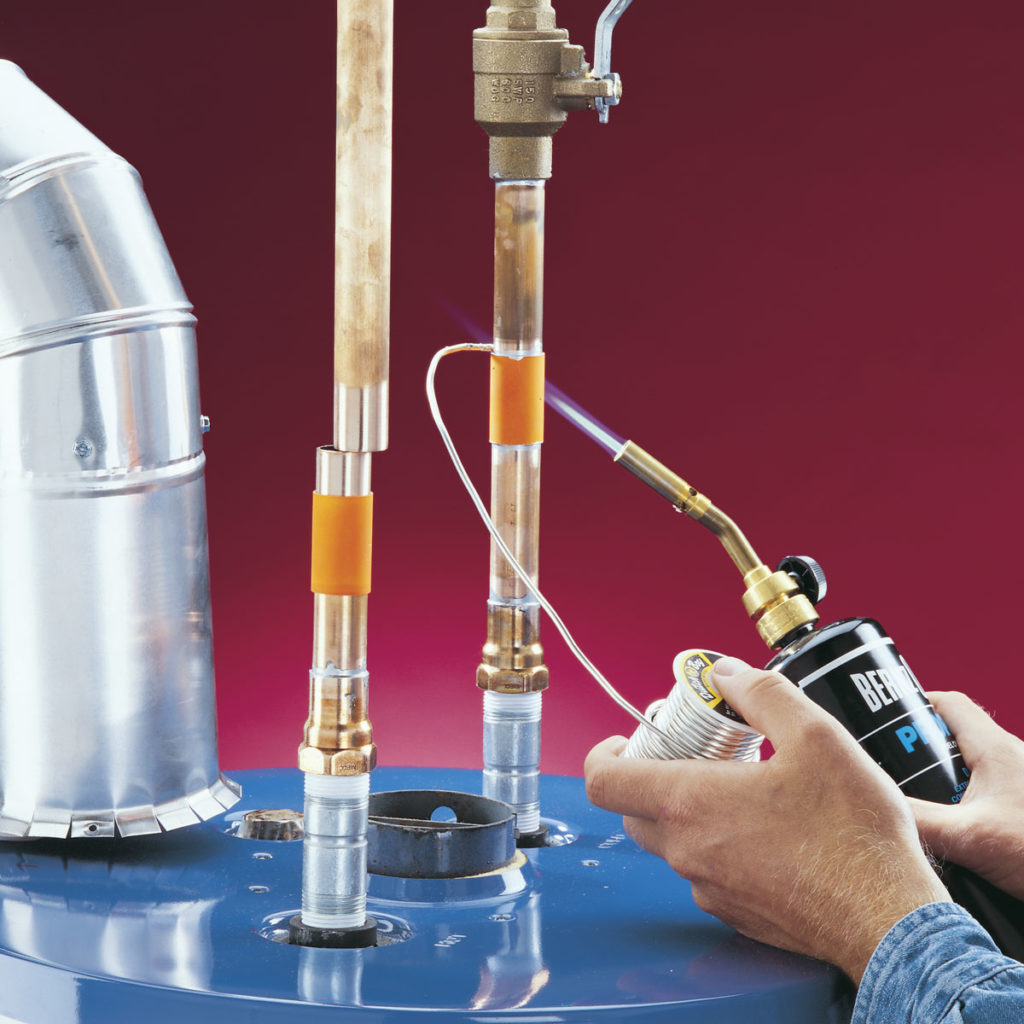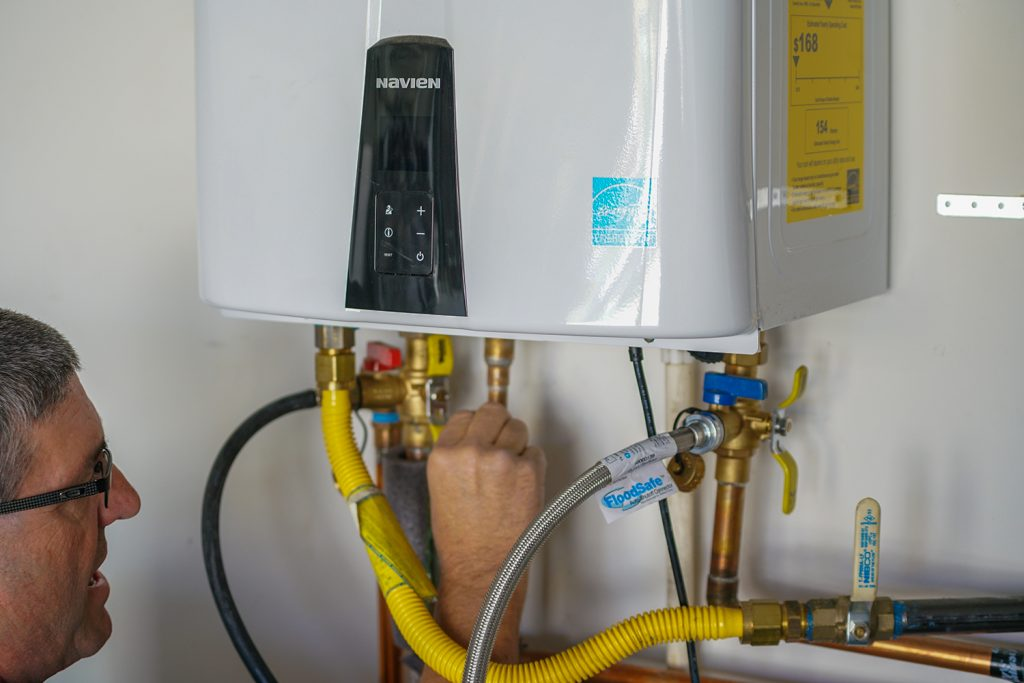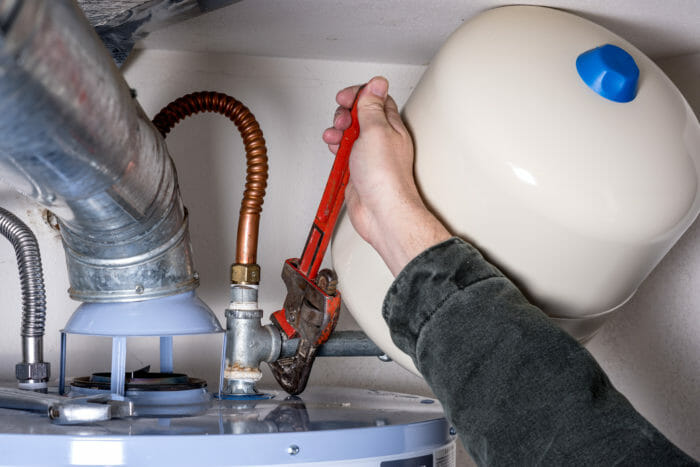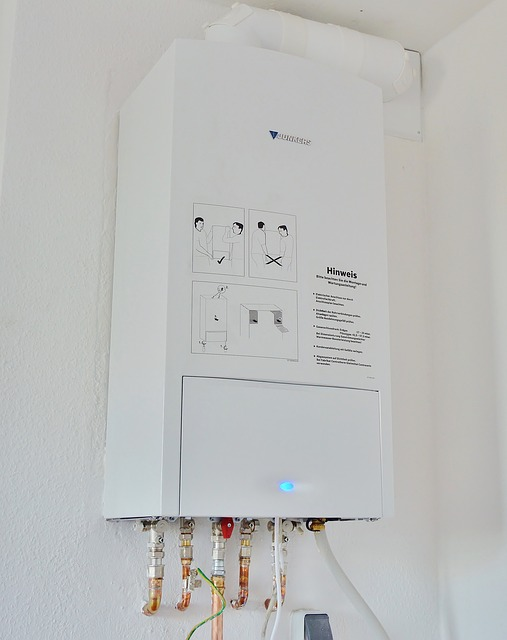How to Fix a Leaking Water Heater
Simple solutions for common water heater leaks.
Fix common water heater leaks from a temperature and pressure relief valve or a water heater drain valve by checking temperature settings and mineral deposits. A simple cap solves the water heater drain valve problem.
Diagnosing a temperature and pressure relief valve leak
The T & P valve, which stands for temperature and pressure relief valve, is a safety device that protects against excessive temperature and pressure levels in the leaking water heater. The valve is located on or near the top of the tank. Part of the valve extends into the unit.
If you have a water heater leaking from relief valve, it usually means the valve is defective (it opened and didn’t close) or the leaking water heater is operating under too high a temperature or pressure.
First, check the water temperature and make sure the setting is about 120 degrees F (or “medium” if your thermostat doesn’t have a degree reading). If you still see the pressure relief valve leaking, remove it and examine it for mineral buildup and signs of corrosion. The minerals in especially hard water can clog it or attack the metal parts, resulting in valve failure. This is especially common with water from a well. And if you have municipal water, check with your local water department to find out if the water supply has a high concentration of minerals. In either case, you’ll have to soften your water.
If the pressure relief valve looks clean, consider two other possible causes: high water pressure in the municipal system or some sort of backflow preventer around the water meter or main shutoff. You’ll need a licensed plumber to diagnose and handle these problems.
Stopping a leaking water heater drain valve leak
You’re supposed to flush your hot water heater regularly to remove sediment from the bottom of the tank. But many homeowners don’t do it until they hear rumbling from the tank. After the flush, they discover that the drain valve leaks. If the drain valve is brass, you can usually replace the washer. Repairing a water heater leaking from the drain valve is a fairly easy but time-consuming fix because you have to shut off the water and drain the tank. If you have a plastic drain valve, your best bet is to replace the entire valve. You guessed it; you’ll have to drain the tank for that fix, too. So how do you stop the drip until you get around to fixing the valve? Simple—buy a brass garden hose end cap and screw it onto the valve threads.

TYPES OF WATER HEATERS
When the time comes to replace your old water heater, you’ll want to choose an energy efficient water heater unit that will provide enough water for your household. Like anything else, technological advancements in plumbing mean that you have more options than ever when it comes to water heaters, so it can be challenging to make an informed decision.
While water heater repair or water heater replacement is best left to the professional plumbers, one job you can and should do yourself is choosing the right water heater to meet the needs of your home and family.
There are many different types of water heaters on the market. Roto-Rooter’s water heater comparison guide is a great starting point to familiarize yourself with what’s out there. Roto-Rooter water heater experts can help you determine which model is right for your home and budget, taking into consideration your family’s water heating needs and energy usage expectations.
CONVENTIONAL WATER HEATERS
Conventional water heaters, also called storage tank water heaters, are the most common type–they consist of an insulated tank in which water is heated and stored until needed. Natural gas water heaters typically use less energy and cost less to operate than electric water heaters, but can be more expensive and difficult to install.
Conventional water heaters require regular maintenance to operate efficiently and effectively over the years. They must be drained and flushed, removing sediment and buildup, at least once a year. The statistical life expectancy of a storage tank water heater is 10-12 years, depending on care and maintenance.
TANKLESS WATER HEATERS (ON-DEMAND)
Tankless water heaters use intense flashes of heat against water-filled coils to heat water on demand. Tankless water heater plumbing systems are more energy efficient than conventional storage tank models, but tend to have higher up-front costs.
Tankless water heaters can be sized to provide a continuous flow of hot water, making them suitable for large families that use a lot of hot water at one time. They’re also better suited for use with natural gas, though they may require installation of a larger diameter gas line, a potentially costly endeavor. Electric tankless models may require an upgrade of the home’s electrical capacity.
Like storage tank water heaters, tankless water heaters need to be descaled of minerals at least once a year to keep them functioning reliably.
HEAT PUMP WATER HEATERS
Heat pump water heaters, also called hybrid electric water heaters, capture heat from the air or ground and transfer it to the water. They cost more up front than standard electric models, but use about 60% less energy, meaning homeowners tend to see a return on their investment in the form of lower energy bills.
Hybrid electric heat pump water heaters don’t work well in very cold spaces. Because the heat pump is on top of the appliance, a hybrid unit may need as much as a 7-foot clearance from floor to ceiling.
SOLAR WATER HEATERS
Solar water heaters work using roof-mounted solar panels that absorb the sun’s heat and transfer it to an antifreeze-like fluid in a closed-loop system that runs to the water tank and heats the water. The best solar water heaters deliver stellar savings in summer, making them attractive for warm, sunny regions. Where available, a Roto-Rooter water heater expert will help you determine which type of solar water heater is right for your home and budget, taking into consideration your family’s water heating needs and energy usage expectations.
Advantages:
- Solar energy is free and plentiful.
- Solar thermal panels are efficient. Approximately 80% radiation is turned into heat energy.
- You will save money on fuel bills.
- You are lowering your hot water carbon footprint.
- There are often financial incentives. For solar hot water, those can include state and federal tax credits, and state, regional, and utility rebates.
Disadvantages:
- Solar thermal panels can only heat water. Solar PV panels, however, generate electricity and some of this electricity can be used to heat water. So there is more flexibility with solar PV panels.
- Annual maintenance is suggested because there are several parts to the system, that should be inspected to ensure they are performing correctly.
- Even with federal and local rebates, what you’ll spend to buy and install a solar system can mean waiting 10 to 30 years to recover your investment costs, although solar panels and equipment are becoming less costly all the time.
CONDENSING WATER HEATERS
Condensing water heaters have a tank like a conventional storage tank water heater, but they capture hot exhaust gases that would normally be expelled from a home out the flue. These gases are blown through a coil in the base of the water heater, where incoming cold water can absord the heat. Condensing water heaters are a highly efficient type of water heater for homes that heat with gas and require a capacity of more than 55 gallons.

Hot Water Heater Giving You Problems?
Out of sight, as they say is out of mind. An old proverb generally used in the context of people and things, but particularly holds true for machines. As long as a machine is able to deliver what it is intended to, we tend to take it for granted. And why not, that is how it is supposed to be. Water heater, sitting at some remote corner of each homeowner’s residence, comes into forefront only when it starts giving trouble.
Just like other mechanical appliances in your home, water heaters also require periodic service and maintenance for smooth and uninterrupted functioning. Water heater as an equipment is a difficult machine to handle, specifically when it comes to repairs. Once your water heater stops working, you should know what to do, whether to apply a DIY approach or to go on and call a plumber.
Types of water heaters
There are two types of water heaters:
- Gas water heater- Runs on natural gas.
- Electric water heater- Runs on electricity.
- Problems you can tackle on your own
On a few occasions you might try to troubleshoot the problem on your own. In gas water heaters, when hot water stops coming out altogether, the first thing to check is the pilot light. If it has blown out, re-ignite the pilot light. This can solve the problem and you will start getting hot water.
In electric water heaters, if hot water comes out for a very short span of time, the first thing to check is the thermostat setting. Adjust the tank’s thermostat to a higher temperature, which can resolve the issue. A word of caution, don’t raise the temperature too high.
When to call a plumber
Water heater repair can prove to be a risky proposition, especially for novices. If you have a gas water heater and you smell gas inside the premises, it is an emergency situation, you need to call water heaters repair services urgently. Failing to do so can prove hazardous for you and your family, as well as your property.
Similarly, in case you find a pool of water on the floor where your electric water heater is installed, you should urgently call a plumber, as it again is a crisis situation. This also can cause grave damage to life and property.
Both these scenarios are dangerous, hence call Adams and Son Plumbing, an experienced plumbing repair company, and get it fixed by a team of professionals.
Some common problems of gas and electric water heaters:
- Smelly water- When the water coming out from the water heater starts smelling foul, or if the color of water changes to light or dark brown. Call water heaters repair services.
- Loud noises emanating from the water tank- Mineral deposits falling to bottom of the tank. Water heater repair is what is required, hence get in touch with a plumber.
- A leak in the tank- If there is a leak in the tank of the water heater, you need to replace your equipment. It is time to replace the unit, call a plumber.

Do You Need A Permit To Install Or Replace An Existing Water Heater?
Building jurisdictions in nearly all cities and counties require a permit to replace an existing water heater. Codes have changed, so the installation of a new water heater should meet current codes for safety purposes.
If a water heater is installed improperly there are many things that can go wrong. A few examples:
- If a water heater is installed without a T&P valve (temperature and pressure relief valve) it may explode. People have died because of this, so it’s important that a water heater have one and that it is properly installed.
- Fire risk and electrical risk. If the water heater is a gas water heater, its very important that the gas line be installed correctly and that it doesn’t leak. If the water heater is an electric one, the wiring needs to be connected properly and if the size of the water heater is increased, then a larger wire size and breaker may be required.
It’s important to remember that there have been code changes and other requirements that may apply to the replacement of an existing water heater.
Permits
Generally, a permit for replacing a water heater is very simple to obtain. Usually a quick trip to the local building department is all that is required, plus a few dollars for the cost of the permit itself. Many building departments have a handout on installing a replacement water heater and are happy to answer any questions that you may have.
When you may need two permits
There are a few instances when two or more permits may be required.
Electrical permit
If there are situations where you have to make electrical modifications or changes, then an electrical permit may be required. For instance, if the breaker and wire size is too small to carry the electrical load of the new water heater, then a permit may be required to make the changes.
Plumbing permit
Should you need to add, extend, or modify any existing water lines to install the new water heater, then you should get a plumbing permit in nearly all building jurisdictions.
If a gas line has to be added or relocated, then a plumbing permit may be required for the modifications or changes; note that just one permit may cover both the water heater and plumbing modifications.
Can you replace a water heater yourself?
The short answer is yes, most of the time. If there needs to be electrical modifications, many building jurisdictions will allow you to do the modifications yourself if its your own home, but a few jurisdictions may require a license electrician to do the work. Occasionally, there may be other exceptions or requirements, however, a call to the local building department will normally provide the answers you need.
Check these items when replacing your water heater
- Vent installations on gas water heaters: Is the vent on top of the water heater fully connected and there are no gaps where carbon monoxide gases can escape? (Read about vent installation)
- Seismic strapping in earthquake zones: If you live in an area that is prone to earthquakes, is your water heater strapped properly? (
- Is the gas line made of rigid aluminum tubing? Rigid aluminum tubing is no longer allowed in most building jurisdictions for safety reasons.

It’s Getting Cold: 5 Signs Your Hot Water Heater is Going Out
- You’re Not Getting Much (or any) Hot Water
A good water heater should be capable of supplying you with enough hot water to get you through the day. This includes being able to serve you and your family during showers while washing the dishes, and while doing other hot water necessary activities. If you’re constantly getting stung by cold water in the shower or are noticing that it takes a long time for your water to warm up once it’s running, you’re experiencing one of the primary signs your water heater is going out.
- Leaks Are Forming
As water heaters get older, they get more leak-prone. Leaks in your hot water heater not only diminish the amount of hot water they can deliver to your home but can also run up your water bill unnecessarily. If you suspect that your water heater may be leaking, call in a water heater professional to service your unit as soon as possible.
- Odd Noises Coming From Your Heater
Modern water heaters are excellent at efficiently heating water without making a noticeable noise. If you’ve noticed a change in the amount of noise your water heater is making, it could be indicative of a problem that’s forming or one that is already present. The longer you let the issue sit, the more severe and costly it may be to fix it. If you’re hearing loud noises coming from your unit, consider shutting it off and scheduling a repair immediately.
- Rust in Water
Heaters that are well past their prime may start to get rusted inside. This rust can then find its way into your water supply. Rust can be dangerous when found in water, especially if you consume water from your home’s tap. Again, a repair professional can help advise on how to best remedy rust coming from your heater and will likely point you in the direction of replacement units worth investing in.
- Your Unit is Just Plain Old
One of the simplest signs your hot water heater is going out that you can easily identify is your unit’s age. If you look at your hot water heater’s manufacturer sticker and notice that it’s over 10 years old, you’ll probably want to get your heater looked at. To extend your water heater’s age, consider hiring a professional to flush your unit on an annual basis.